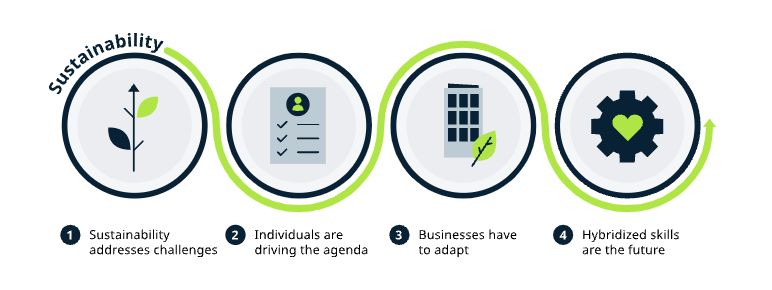Sustainability is no longer just a buzzword for environmentalists. Decision makers across the corporate world, government and public sectors have come to view sustainability as an ‘economic imperative’.
Left and Right Agree
Amway CEO and billionaire Dick DeVos once stated that “sustainability is not just an environmental concept, it’s also an economic one. If a particular business approach is not economically viable, it will not be sustainable”. He later launched the Windquest Group in 1998, a private equity firm that makes investments in projects that would create innovative alternative clean-green energy forms.
So when it comes to sustainability, even right-wing magnates like DeVos are “all-in” and with ample reason. There’s plenty of data now available to show that it’s the right course. This is evident in the trends observed in the 2019 Retail and Sustainability Survey Report commissioned by CGS, a global provider of business applications.
What Exactly Is Sustainability?

Defined simply, sustainability is about acting responsibly with our resources to safeguard our future communities and the environment. However, according to the GetSmarter Sustainability Report, the first thing to know is that ‘sustainability’ does not equal ‘environmentalism’. Protecting the environment is more like a subcategory of sustainability, which encompasses a much wider range of fields and institutional organizations.
In short, sustainability is an attempt to integrate environmental well-being, social equality and economic vitality. This means sustainability is not just about a company reducing its carbon footprint by switching to solar energy, or eliminating waste or reducing pollutants in the environment.
Three Pillars of Sustainability

Globally, sustainability is quantified through three main pillars: Environmental, Social, And Governance (ESG).
- Environmental sustainability considers how a company performs as a steward of nature in order to conserve natural resources and protect global ecosystems
- Social sustainability examines how a business manages relationships with suppliers, employees, customers, and the local communities around it.
- Sustainable governance deals with responsible leadership, internal controls, audits, executive pay and the rights of the shareholders, among others
Key Findings of GetSmarter Sustainability Report

GetSmarter Sustainability Report reveals that the growth in sustainable practices by corporate companies is driven by the highest ESG priority placed on social issues, followed by environmental challenges. This echoes the rise in social equality and climate change issues globally:
- Social sustainability – 32%
- Environmental sustainability – 29%
- Governance sustainability – 9%
The GetSmarter research found that the most common ESG factors used for reporting sustainability dovetail with the globally accepted standards, the UN Sustainable Development Goals (SDGs). According to the survey, the most urgent SDGs for building a resilient future are:
- Goal 13: Climate action
- Goal 4: Quality education
- Goal 12: Responsible consumption and production
Apart from these Smart Goals, further findings of the GetSmarter’s Sustainability survey are as follows:
- Most respondents (66%) believe that delivering successful sustainable development is a joint responsibility for governments, non-profit organizations, private companies, and individuals.
- Nearly 70% of Generation Z consumers made an eco-friendly purchase within the past year. This is significant because these young people are considered as the most important market segment of the future.
- Building brand loyalty will depend on maintaining a high product quality (the largest response) and managing a sustainable business practice (the second-highest response).
- Sustainability is also driving the growth of impact investments that create beneficial and measurable social and environmental impact alongside a financial return.
A Historic Imperative
Is it easier said than done? Certainly, but many leaders are calling where we stand today “an inflection point”. The world population will reach 9 billion people in less than 30 years. To support and sustain so many people without destroying the planet’s ecosystem is the most critical challenge of our times. Understanding their importance, many individuals are taking up education courses on implementing sustainability practices. Some of these sustainability qualifications are short-term courses like the ones offered by GetSmarter.

